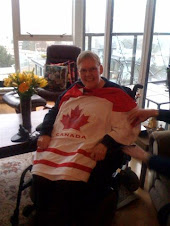MONTREAL - The start of Tony Proudfoot’s Canadian Football League career with the Alouettes was hardly auspicious, giving no indication of the greatness that was to come.
Drafted in the fourth round (36th overall) of the 1971 Canadian college draft out of the University of New Brunswick, Proudfoot couldn’t crack the Als’ roster as a linebacker, the position he played collegiately, and was released – only to re-sign with Montreal in 1973 and eventually be converted to defensive back.
It was through that will and dogged determination that Proudfoot constantly overcame the odds, until the end, when not even he could defeat the biggest fight of his life. Proudfoot died Thursday at a palliative-care centre, following a courageous, and public, battle with amyothrophic lateral sclerosis (ALS). The disease, diagnosed in May 2007, is a progressive, fatal neurodegenerative condition.
He was 61.
Born in Winnipeg, John A. “Tony” Proudfoot eventually moved with his family to Pointe Claire, where he attended John Rennie High School before heading to the Maritimes and UNB. In 1970, he was nominated for the Hec Crighton Trophy, awarded annually to the top player in Canadian university ranks. He graduated with a bachelor’s degree in physical education.
Proudfoot made a smooth transition into the Als’ secondary, playing 107 regular-season games between 1971-79. He won two Grey Cups with Montreal, in 1974 and ’77, and was named a CFL all-star both seasons.
In July 1977, Marv Levy, the Als’ head coach at the time, described Proudfoot as a “very smart football player.” Proudfoot always said he didn’t have an abundance of natural ability, crediting his success with being able to work, learn, ask good questions and quickly process that information on the field.
He is best remembered for spontaneously creating the advantage that carried Montreal to a lopsided 41-6 victory over Edmonton in the 1977 championship game, played on an icy Olympic Stadium field. Proudfoot used a staple gun, borrowed from a Bell Canada electrician, to affix staples onto the bottom of his, and his teammates’, shoes. It provided better footing and a decisive edge the Eskimos failed to overcome.
Proudfoot concluded his 12-year CFL career by playing three seasons with the British Columbia Lions, beginning in 1980.
In retirement, he had a successful career as a teacher, coach, broadcaster, journalist and author.
Proudfoot taught phys ed at Dawson College for 30 years. He lectured in exercise science at Concordia and McGill. He was a Stingers’ assistant coach for four years, including the 1998 team that reached the Vanier Cup, and continued his education, receiving a master’s degree in sports science from McGill.
The Als’ franchise returned to the CFL in 1996, following a nine-year hiatus, and Proudfoot became a full-time analyst with Montreal radio station CJAD, the team’s rights holder, two years later. That didn’t prevent Proudfoot from becoming an assistant coach with the Als in 2001, under head coach Rod Rust; Proudfoot continued his career as an unbiased and opinionated broadcaster.
In 2006, during a shooting rampage at Dawson College that killed one student, Proudfoot, who was trained in CPR, risked his life to tend to a student he saw injured. While the shooting continued, and until an ambulance arrived, Proudfoot administered first aid to a male student who survived despite being shot in the head.
It was while lecturing at Concordia, in the winter of 2007, Proudfoot noticed his slurred speech. He underwent tests before learning of the ALS diagnosis that May. One month later, before an Als home game, he publicly revealed his condition during an Olympic Stadium news conference.
Rather than sink into oblivion, Proudfoot used his condition as a platform, informing the public with regularity of his trials and tribulations through a series of articles written for The Gazette. In the final piece, published in mid December, Proudfoot poignantly spoke of his “imminent” death, sending out a goodbye message while admitting he hoped to make it to Christmas.
“I’ve been blessed with so much love and support, it’s truly overwhelming,” Proudfoot said. “The concern and compassion everyone has afforded me is amazing, unfathomable.”
He was strapped to a ventilator, for oxygen, up to 22 hours daily.
“Focusing on my next breath requires all of my energy,” he wrote. “I am starved of air and oxygen and need to rely on a ventilator just to feel stable, just to live.”
Proudfoot admitted the reality of his situation had been “awful and downright frightening,” but implored Gazette readers “not to worry about me.”
He raised more than $500,000 after establishing the Tony Proudfoot Fund for ALS research and remained active in the game he loved until the end. An Als guest coach at training camp in 2008, Proudfoot served as a special consultant to head coach Marc Trestman the last two seasons.
His last public appearance came in November, before the East Division final, when Proudfoot accepted the Hugh Campbell Award for Distinguished Leadership from CFL commissioner Mark Cohon.
In typical modest fashion, Proudfoot sent an email to Ronnie James, the Als’ equipment manager, notifying him the end had come while asking James to notify players, coaches and members of the team’s staff.
“I have finally lost the battle with ALS and I am going into a palliative care unit Dec. 28th,” Proudfoot wrote. “It should take a few days for me to die. I want to thank all the players, coaches and Alouettes staff for the support they have given me over the last three and (a) half years. Bye everybody, Tony.”
Proudfoot is survived by his wife, Vicki, and three children – Michael, Lindsay and Lauren.
Read more: http://www.montrealgazette.com/health/Former+Alouette+Proudfoot+loses+battle+with/4045473/story.html#ixzz19izSb9GZ








 Editor's note: The Montreal Gazette has graciously allowed FanHouse to publish an excerpt of
Editor's note: The Montreal Gazette has graciously allowed FanHouse to publish an excerpt of 




































































































































































































